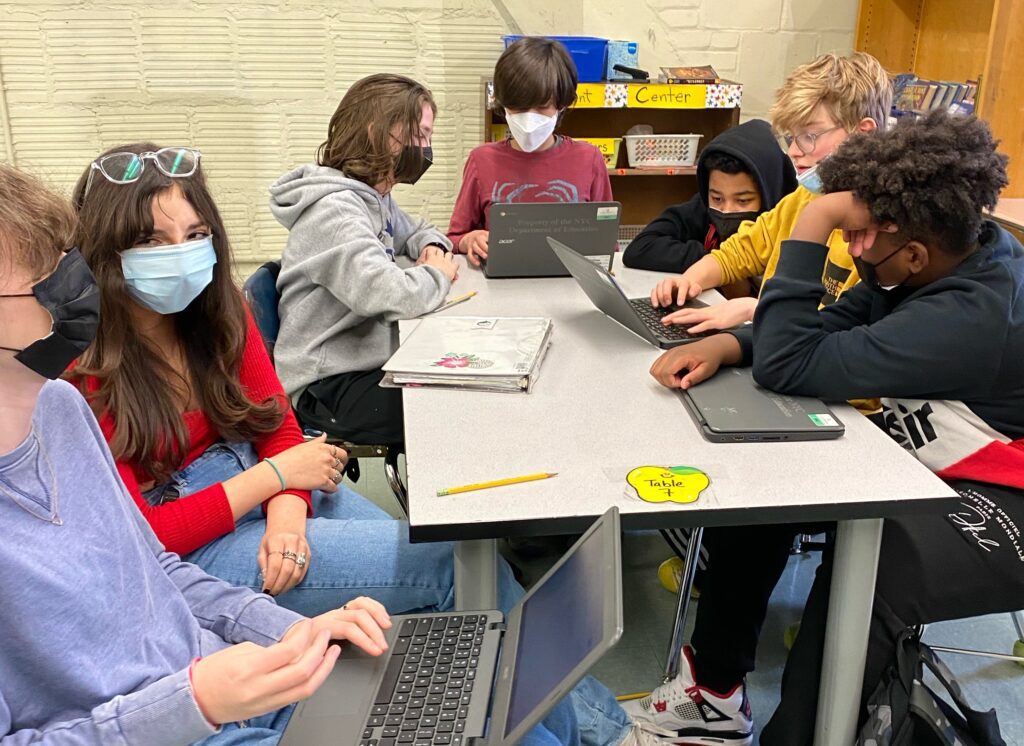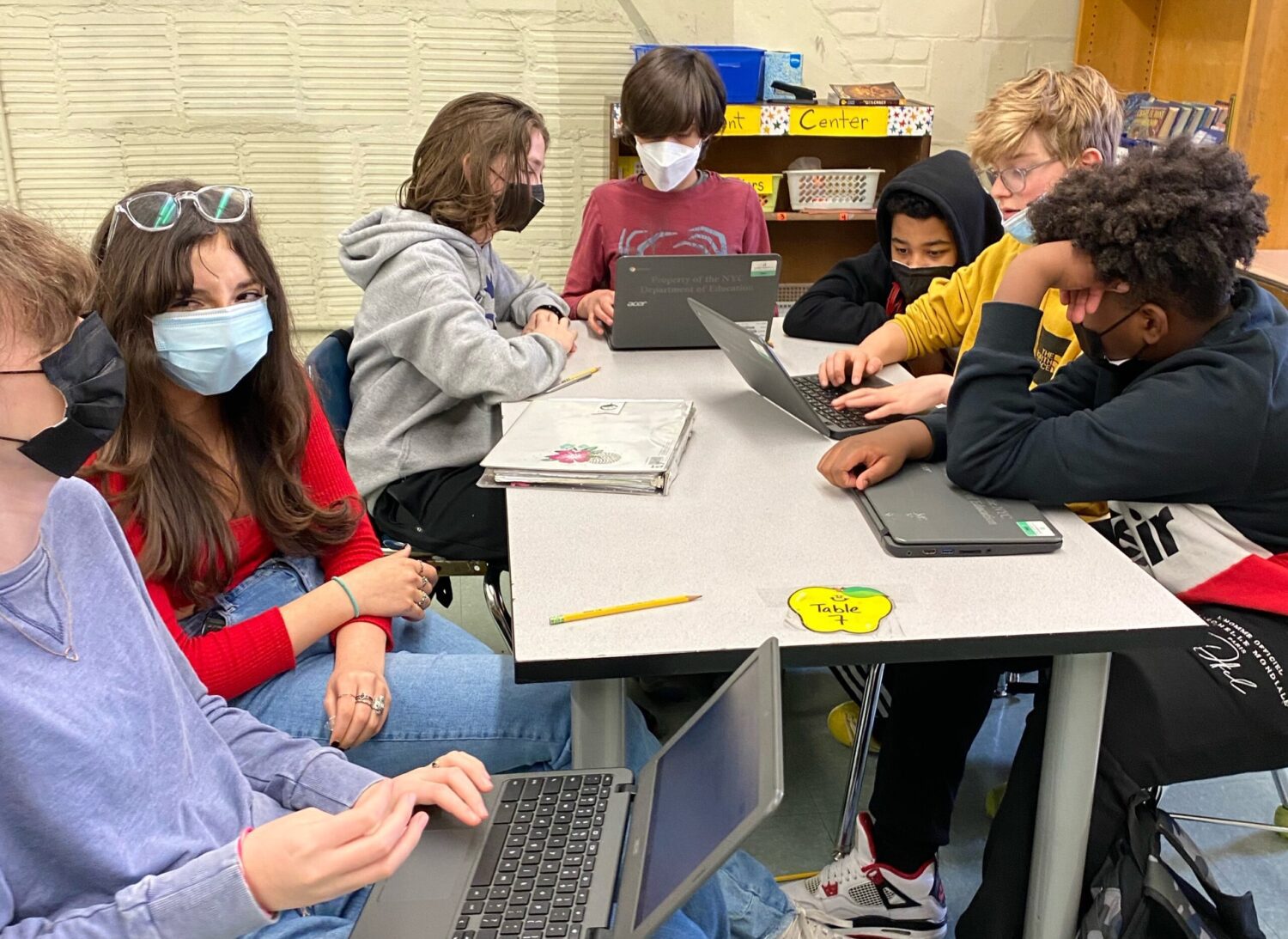


Middle school student activists write their elected representatives to urge climate action.
By Reynard Loki, Independent Media Institute
17 min read
In 2019, Earth | Food | Life writing fellow Lucy Goodchild van Hilten, a science writer and mother of a young child, wrote a piece titled, “How to Talk to Kids About Climate Change.” Now I am pleased to report on the other side of that coin: How kids talk to adults about climate change.
It all started a few weeks ago when my friend Christine Willis invited me to speak to her seventh grade class at the Math and Science Exploratory School in Brooklyn, New York. Christine and her co-teacher Allison Pariani wanted their students—who are all quite aware of the various impacts of climate change—to grasp the power and potential of persuasive writing and thought that my work as an advocacy journalist would help. At the recommendation of another friend, Megan Dyer, herself a New York-based climate activist with Mothers Out Front and mother of a 12-year-old and a 15-year-old, I had the class sit in a circle to create a space where we could exchange ideas as peers.
As Dyer told me, “Kids are so used to being talked to; so they love when they are heard.” Instead of presenting to them, I simply asked them questions to get to the activity I had in mind: Write letters to five of their elected legislators: Senator Chuck Schumer, Senator Kirsten Gillibrand, Representative Hakeem Jeffries, State Senator Jabari Brisport and State Assemblymember Jo Anne Simon.
In the circle, I asked them what journalism was, and what advocacy meant. Through this, they were able to figure out for themselves what “advocacy journalism” was—journalism with a point of view; in my case, it’s about getting consumers, voters, community members, public officials and legislators to take action to stem the climate crisis. I told them that part of what I do as an advocacy journalist covering the environment is to provide readers not only with facts about the climate crisis but also to show them ways to get involved in solutions. One direct way to get involved is to tell our elected representatives how we would like them to vote on bills and budgets that can have a meaningful impact on the climate fight. I showed them how to look up their elected representatives via OpenStates.org.
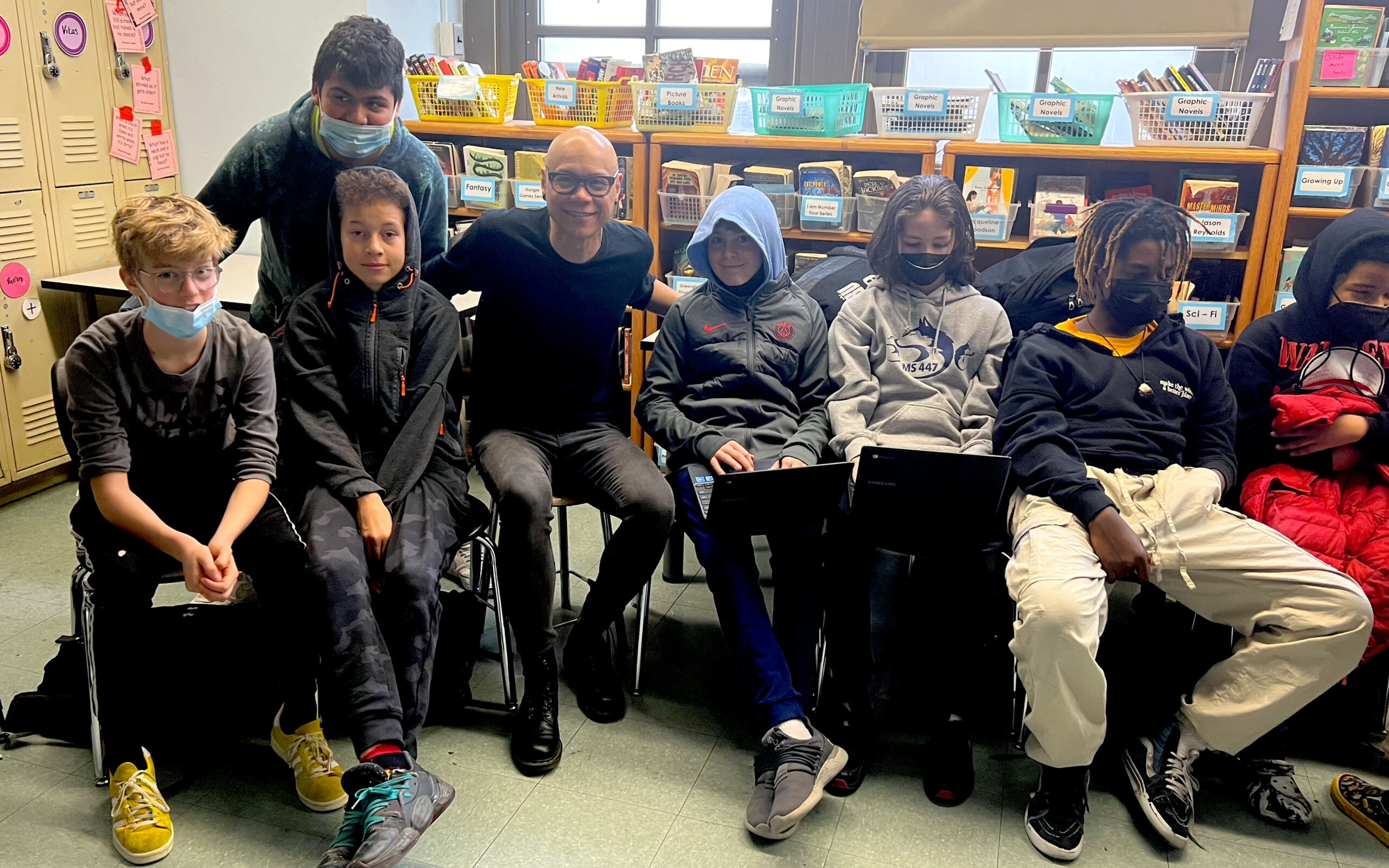
One of the questions I asked them is what concerns them about climate change. Their answers varied, but they were all legitimate fears. They are worried about rising sea levels, extreme weather events, the spread of disease, air pollution and the extinction crisis—all issues directly impacted by the climate crisis. I showed them a video about how St. Patrick’s Cathedral in Manhattan has switched from using oil and gas heating to a renewable heat source: geothermal energy.
I provided the students with letter templates urging lawmakers to support a part of the New York state budget that puts buildings on a renewable energy path, and bills on the state and federal levels aimed to strengthen our response to the climate crisis. The students reviewed the letters and added their own words to personalize them. Their parents approved these letters (below), which were emailed and tweeted to the legislators.
Mss. Christine Willis and Allison Parianis’ Seventh Grade Class
The Math and Science Exploratory School (MS447)
345 Dean Street
Brooklyn, NY 11217
April 4, 2022
Assemblymember Jo Anne Simon
New York State Assembly
341 Smith Street
Brooklyn, NY 11231
Dear Assemblymember Simon:
Our names are Teyo, Rose, Elsie, Adriana, Amelie, and Luolin. We are students in Ms. Willis’ seventh grade class at the Math and Science Exploratory School in Brooklyn, New York. We are also your constituents. Climate action is one of our top priorities because we care a lot about the rising sea levels that are swallowing up the world. We are especially worried because we live in a coastal city.
We have no idea if this letter will make a difference. It probably won’t. We don’t really see a reason why it would. We have faith in people. We believe they are naturally good. But after everything the climate is facing and the lack of action from adults, we have very little faith in lawmakers and elected leaders who are supposed to be protecting the future for kids like us.
We are especially concerned about emissions from buildings which account for more than one-third of all greenhouse gas emissions in New York State. We need renewable heat for our buildings now, and geothermal energy can help.
We are writing you today to urge you to support:
- Part EEE of the Senate’s TED (transportation, economic development and environmental conservation) budget proposal, which updates building codes and appliance efficiency standards, saving New Yorkers billions of dollars, and prohibiting fossil fuels in new construction starting in 2024.
- Gas Transition and Affordable Energy Act sponsored by Senator Krueger (S8198) and Assemblymember Fahy (A9329), which reforms our public service law and requires the state to make a transition plan for buildings.
We need fossil fuels out of new building construction by 2024 and we must stop subsidizing gas utility expansion. We must stop fossil fuel expansion in New York and implement our climate law in our state budget.
Thank you.
Sincerely,
Teyo Chait, Rose Herper, Elsie Armstrong, Adriana Esposito, Amelie Miller, and Luolin Wu
Mss. Christine Willis and Allison Parianis’ Seventh Grade Class
The Math and Science Exploratory School (MS447)
345 Dean Street
Brooklyn, NY 11217
April 4, 2022
Senator Jabari Brisport
New York State Senate
55 Hanson Place
The Shirley Chisholm State Office Building, Suite 702
Brooklyn, NY 11217
Dear Senator Brisport:
I am a student in Ms. Willis’ seventh grade class at the Math and Science Exploratory School in Brooklyn, New York. I am also your constituent. Climate action is one of my top priorities because if people do not take action now, there would be a worldwide increase in storms, major sea-level rise, and massive ecological loss.
I am especially concerned about emissions from buildings which account for more than one-third of all greenhouse gas emissions in New York State. We need renewable heat for our buildings now, and geothermal energy can help.
I am writing you today to urge you to support:
- Part EEE of the Senate’s TED (transportation, economic development and environmental conservation) budget proposal, which updates building codes and appliance efficiency standards, saving New Yorkers billions of dollars, and prohibiting fossil fuels in new construction starting in 2024.
- Gas Transition and Affordable Energy Act sponsored by Senator Krueger (S8198) and Assemblymember Fahy (A9329), which reforms our public service law and requires the state to make a transition plan for buildings.
We need fossil fuels out of new building construction by 2024 and we must stop subsidizing gas utility expansion. We must stop fossil fuel expansion in New York and implement our climate law in our state budget. If our state budget supported a quick switch to renewable energy, including geothermal power for the heating of buildings, fossil fuel emissions in New York would fall, and the government would save huge amounts of money that could be used to better the lives of our citizens. We would also be less dependent on Russian oil imports.
Geothermal systems can last over fifty years, and building them would bring lots of jobs. This would help the economy. If New York succeeds at protecting the environment and saving money, it would also inspire other states to do the same. And this would help protect the planet. Thank you.
Sincerely,
Connor Nagi-Barron
Mss. Christine Willis and Allison Parianis’ Seventh Grade Class
The Math and Science Exploratory School (MS447)
345 Dean Street
Brooklyn, NY 11217
April 4, 2022
Senator Kirsten E. Gillibrand
780 Third Avenue, Suite 2601
New York, New York 10017
Dear Senator Gillibrand:
Our names are Adriana Esposito and Amelie Miller. We are students in Ms. Willis’ seventh grade class at the Math and Science Exploratory School in Brooklyn, New York. We are also your constituents.
Climate action is one of our top priorities because we are dedicated to making a brighter and safer future for future generations of humans and all animals. The natural habitats for our beloved animals are being continuously devastated from their past state due to climate change. Approximately 300,000 animals die every year due to climate change. We are determined to make a change for our planet so everyone and every living thing can live healthy lives.
In New York State alone, there are more than 50 endangered animal species like the gray wolf, cougar, peregrine falcon, leatherback sea turtle, the shortnose sturgeon, and the Karner blue butterfly.
As you know, the Endangered Species Act (ESA) is the nation’s primary law protecting endangered species. “This benchmark conservation law has saved the bald eagle, gray whale, grizzly bear, and many others and has a whopping 99 percent success record at preventing the extinction of listed species,” according to the Endangered Species Coalition, a nonprofit conservation group.
They add, “In spite of the success of this law and the urgent need for the protections it provides, Congress has taken aim at it with more than two dozen pieces of legislation that would weaken it. Bills that would transfer Endangered Species Act listing decisions from scientists to politicians, legislatively delist wolves, and block courts from reviewing these actions.”
Please support the Endangered Species Act and oppose any efforts to weaken it.
Sincerely,
Adriana Esposito and Amelie Miller
Mss. Christine Willis and Allison Parianis’ Seventh Grade Class
The Math and Science Exploratory School (MS447)
345 Dean Street
Brooklyn, NY 11217
April 4, 2022
Senator Charles E. Schumer
780 Third Avenue, Suite 2301
New York, NY 10017
Dear Senator Schumer:
Our names are Jude, Christian, and Gio. We are students in Ms. Willis’ seventh grade class at the Math and Science Exploratory School. We live in Brooklyn and Queens, New York. We are also your constituents.
Climate action is one of our top priorities because pollution is affecting the natural habitats in our city. Every day we see oil leaks, smell air pollution, and hear too many vehicle engines. We want to have healthy ecosystems in New York state so that we can go out and experience nature and the wildlife of New York can also have safe, healthy and functional habitats.
We are writing to you today to urge you to co-sponsor Senate Bill S.966, the Climate Change Education Act, which was introduced by Senator Edward Markey of Massachusetts.
If passed, this bill would declare that the evidence showing that climate change is caused by humans is “overwhelming and undeniable.” This bill would help increase the level of climate literacy in the United States at a time when many Americans are in denial of the climate crisis. The bill would also provide learning opportunities about climate change to people of all ages.
Please support the Climate Change Education Act so that kids and adults across our nation will get the best, most up-to-date scientific information about the climate crisis so that we can move together as a nation to solve this problem and protect the environment for future generations.
Sincerely,
Jude Sokol, Christian Campbell, and Giovanni Escoto
Mss. Christine Willis and Allison Parianis’ Seventh Grade Class
The Math and Science Exploratory School (MS447)
345 Dean Street
Brooklyn, NY 11217
April 4, 2022
Representative Hakeem S. Jeffries
U.S. House of Representatives
55 Hanson Place, Suite 603
Brooklyn, NY 11217
Dear Rep. Jeffries:
I am a student in Ms. Willis’ seventh grade class at the Math and Science Exploratory School in Brooklyn, New York. I am also your constituent. Climate action is one of my top priorities because I care for the environment. If we continue to use fossil fuels, there will be more harmful pollution, and our natural habitats and ecosystems could become dead zones. I love New York, and I know that renewable sources of energy will help protect our beautiful state, our fellow citizens, and all the species that live here.
I am writing you today to support H.R.794, the Climate Emergency Act of 2021, which was introduced into the House of Representatives by Rep. Earl Blumenauer of Oregon. If passed, this bill would direct the president to declare a national climate emergency under the National Emergencies Act. Declaring a climate emergency would provide Congress and the president with access to the emergency resources necessary for a more immediate and effective response to the climate crisis.
The climate emergency is here and humans and animals and plants are feeling its effects across the globe. We are running out of time and cannot stop the climate crisis without an emergency-level response—and leaders with the courage to take serious action right now.
Please co-sponsor H.R.794 to make the climate crisis a top priority. Thank you.
Sincerely,
Adam Friedkin
Take action…
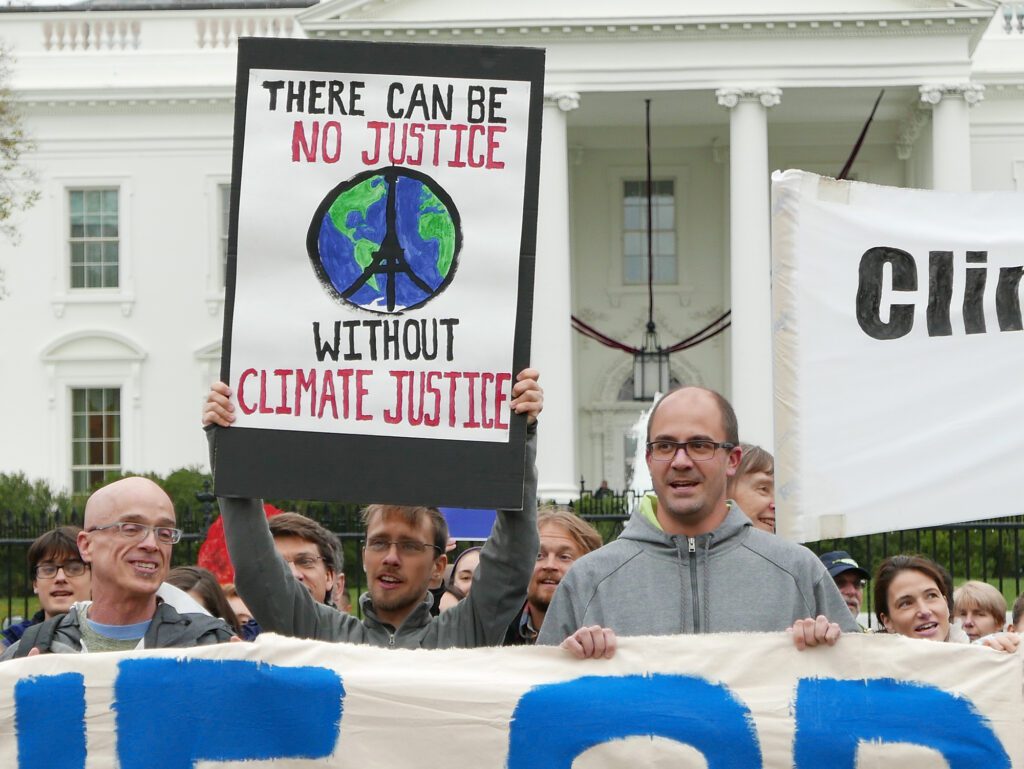
President Biden: Declare climate change a national emergency
Introduced by Rep Earl Blumenauer (D-OR), the National Climate Emergency Act (H.R. 794) directs the President to declare a national emergency with respect to climate change.
The bill states that the President, “in responding to the emergency, must ensure that the government invests in large scale mitigation and resiliency projects; makes investments that enable a racially and socially just transition to a clean energy economy by ensuring that at least 40 percent of investments flow to historically disadvantaged communities; avoids solutions that increase inequality or violate human rights; creates jobs that conform to labor standards that provide family sustaining wages and benefits and ensure safe workplaces; prioritizes local and equitable hiring and contracting that creates opportunities for marginalized communities; combats environmental injustice; and reinvests in existing public sector institutions and creates new public sector institutions to strategically mobilize and channel investments at the scale and pace required by the national emergency.”
Urge Congress to declare a national climate emergency and pass H.R. 794.
Cause for concern…
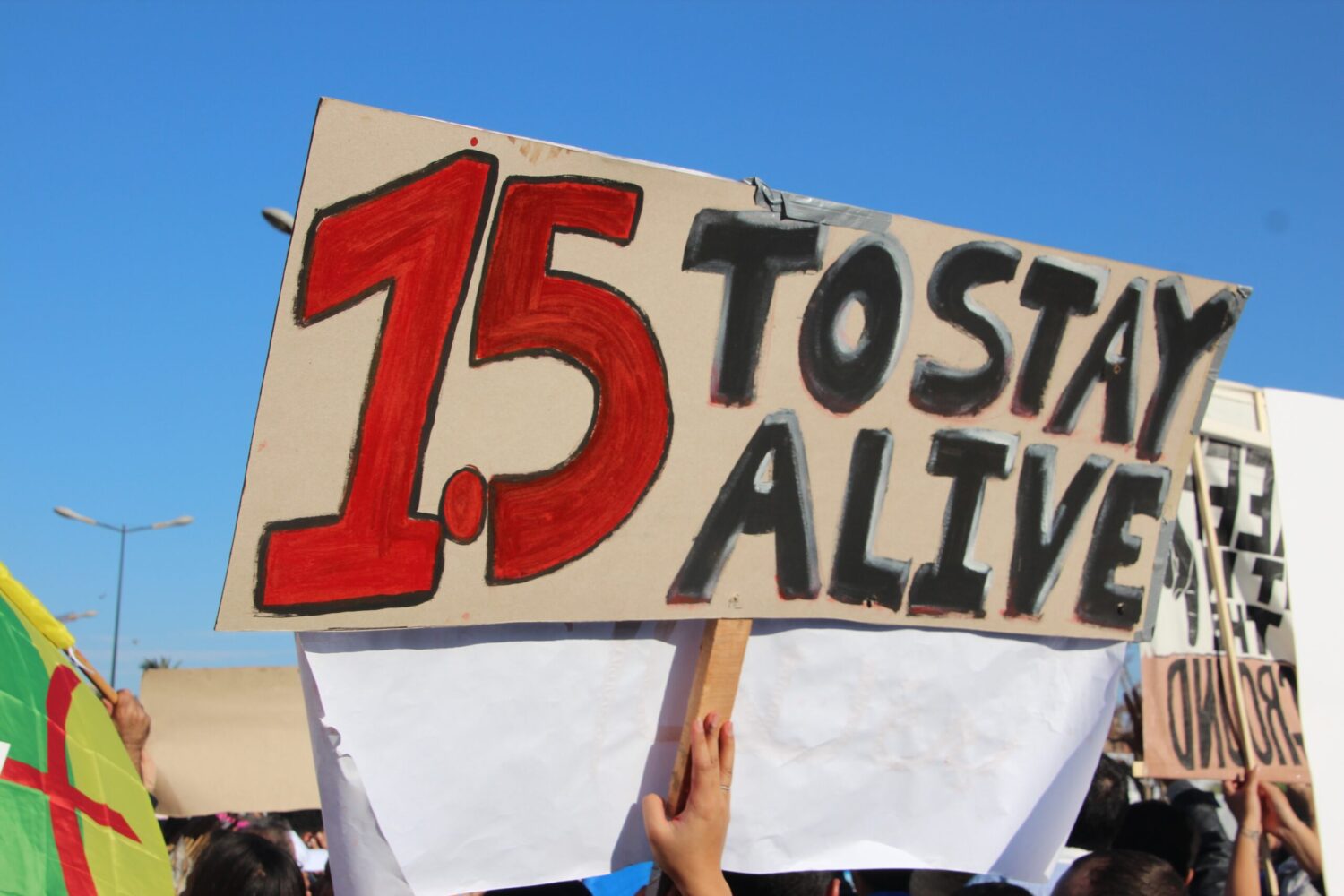
UN warns Earth ‘firmly on track toward an unlivable world’
“Temperatures on Earth will shoot past a key danger point unless greenhouse gas emissions fall faster than countries have committed, the world’s top body of climate scientists said Monday, warning of the consequences of inaction but also noting hopeful signs of progress.
“U.N. Secretary-General Antonio Guterres said the report by the Intergovernmental Panel on Climate Change revealed ‘a litany of broken climate promises’ by governments and corporations, accusing them of stoking global warming by clinging to harmful fossil fuels.
“‘It is a file of shame, cataloging the empty pledges that put us firmly on track toward an unlivable world,’ he said.”
—Frank Jordans and Seth Borenstein, “UN warns Earth ‘firmly on track toward an unlivable world’” (AP News, April 4, 2022)
Round of applause…
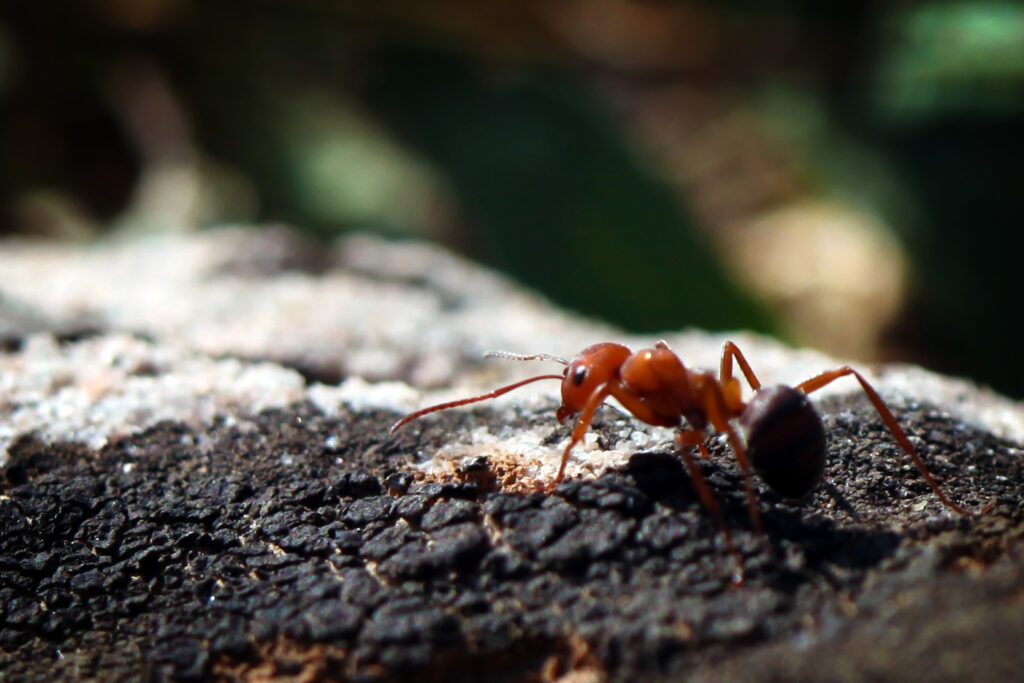
Ants observed healing wounded trees in bizarre, never-before-seen behavior
Ants have been seen healing wounded trees in Panama—behavior that is believed to have never been observed before. When holes were drilled into Cecropia tree trunks, the ants emerged from their homes to patch up the wounds, significantly reducing the size of the holes within 2 1/2 hours and leaving them completely healed within 24 hours.
Details of this newly discovered behavior were published in the Journal of Hymenoptera Research. Azteca ants and Cecropia trees are known to have a symbiotic relationship, with the ants using the trees as their homes. The trunk is like an ant apartment, with more floors added as the tree grows. Inside there are passages, allowing the ants to move around, with small openings letting them go outside. In exchange for their home, the ants defend the Cecropia leaves from herbivores.
—Hannah Osborne, “Ants observed healing wounded trees in bizarre, never-before-seen behavior” (Newsweek, January 6, 2022)
ICYMI…

“U.S. Vice President Kamala Harris does not have any biological children and grew up middle-class. Meanwhile, Utah Senator Mitt Romney, a Mormon with five kids, was born into wealth and has substantially increased it for his family. Their lives prefigure very different futures for the country and its children.
“If those in the U.S. who are privileged enough to be able to follow Romney’s example of having unearned family privileges and a large family choose to do so, then the entire country will eventually arrive at an ecologically degraded and unsustainable future, as well as a crowded political system, where the day-to-day reality of life is defined by massive inequity driven by family wealth. The increase in population, which is ‘rising unevenly,’ is one of the contributing factors leading to an ‘unprecedented’ decline in nature that is ‘accelerating’ species extinction rates, according to a report by the Intergovernmental Science-Policy Platform on Biodiversity and Ecosystem Services. The continued and unchecked growth of the human population might exacerbate this situation further.
“Meanwhile, if we follow Harris’ example, and especially if she uses her earned wealth to further social justice in her current position, we arrive at a more sustainable future and an optimal world population, where every vote counts, and privilege is earned rather than inherited.”
—EFL contributor Carter Dillard, “Kamala vs. Mitt: Two Different Viewpoints of Family Planning Prefigure Different Futures for Planetary Health” (NationofChange, December 9, 2021)
Parting thought…

Reynard Loki is a writing fellow at the Independent Media Institute, where he serves as the editor and chief correspondent for Earth | Food | Life. He previously served as the environment, food and animal rights editor at AlterNet and as a reporter for Justmeans/3BL Media covering sustainability and corporate social responsibility. He was named one of FilterBuy’s Top 50 Health & Environmental Journalists to Follow in 2016. His work has been published by Yes! Magazine, Salon, Truthout, BillMoyers.com, Counterpunch, EcoWatch and Truthdig, among others.
Earth | Food | Life (EFL) explores the critical and often interconnected issues facing the climate/environment, food/agriculture and nature/animal rights, and champions action; specifically, how responsible citizens, voters and consumers can help put society on an ethical path of sustainability that respects the rights of all species who call this planet home. EFL emphasizes the idea that everything is connected, so every decision matters.
Click here to support the work of EFL and the Independent Media Institute.
Questions, comments, suggestions, submissions? Contact EFL editor Reynard Loki at [email protected]. Follow EFL on Twitter @EarthFoodLife.
